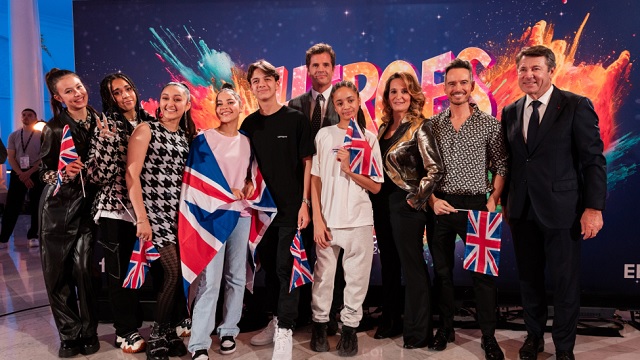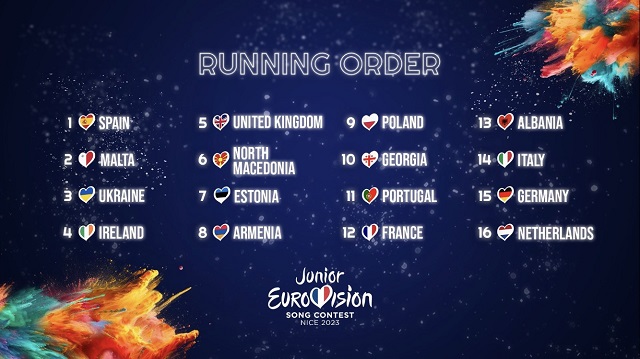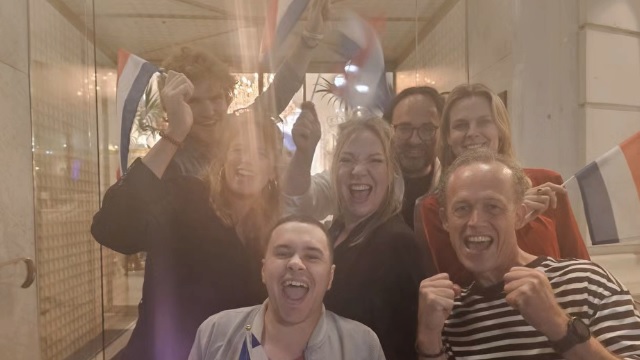On the evening of Monday 20th November the Opening Ceremony for Junior Eurovision 2023 took place in the extravagant Hotel Negresco in Nice, France. This palatial hotel on Nice’s grand Promenade des Anglais has a rich history of decadence, with Louis Armstrong and Elton John amongst previous celebrity guests.
Now it can add the glamour of Europe’s future stars to that grand history.

The United Kingdom arrives at the Opening Ceremony (Photo: Corinne Cumming, EBU)
The Impact Of Running Order At Junior Eurovision
As per tradition it is at the Opening Ceremony that draws determine part of the running order for Junior Eurovision. Before deep-diving into the results of the published running order, let’s investigate the significance of running order bias at Junior Eurovision.
Now there are reasons why we would expect Junior Eurovision Song Contest to have a smaller impact with regards to the running order than the Eurovision in May. Firstly there are less songs, meaning less fatigue from start to end in the show compared to a Eurovision Grand Final. Secondly we note that, while 50/50 between jury and public vote, the public vote spread is much flatter compared to the jury vote, and juries (while certainly prone to running order bias of their own) show in the Eurovision Song Contest less variance to the running order compared to public voters. Finally, one notes that the Junior Eurovision voting system allows for public voting before the show, as well as after all the songs, and this pre-show voting should be less impacted by running order bias.
To investigate this, I investigate the correlation between the running order position and the number of points received from the jury and public in the past five years of voting at Junior Eurovision. Junior Eurovision has used the current voting system (with only minor tweaks throughout) since 2017, however, because the 2017 system had a notable voting crash during the live broadcast, I do not include those results in this analysis.
In the data below, a value of +1 suggests that later running order = more points, while -1 suggests that a later running order = less points. Of course we would anticipate values to be close to 0, as there are many other factors than the running order that determines your success in any competition of song.

Table showing the correlation coefficients of juries and public vote points compared to the running order at Junior Eurovision since 2018
The data from Junior Eurovision shows a miniscule positive correlation for the impact of running order on your chances of doing well in the contest. However these measurements are not at all positive enough for me to decree that running order alone has an statistically significance on your chances on succeeding in Junior Eurovision.
For comparison, the same statistics for the Eurovision Song Contest Semi Finals from 2018-2022 (chosen as the show is a similar length to Junior Eurovision) shows the jury correlation to running order as +0.19, and the public vote as +0.30. While not a large difference this does suggest that the running order at the Eurovision Song Contest is a bigger factor than that Junior Eurovision. Even noting that, running order bias at the Eurovision Song Contest is rarely more than a few perecentage points either way on a song’s final outcome. Running order bias may exist, but it makes a tiny difference and an even smaller one at Junior Eurovision.
The Random Draws
The running order for Junior Eurovision is made by the producers of the show, with three exceptions.
Random draws were done to decide who would open (Spain) and who would close the competition (The Netherlands), as well as the position of the host delegation from France (singing in position 12). After that the producers deliberate to place all the other nations to create the show’s running order.

The running order for Junior Eurovision 2023 (Image: EBU)
If we start with the Netherlands ending the show, of course we are going to say congratulations to the Dutch team for this draw position. But even more than that ‘Holding On To You’ was the closing song in the Junior Songfestival, and there’s something about the Dutch entry sonically that screams show closer and is guaranteed to create the biggest of big raves in the arena. This will not just end the show with a feel-good factor, I think this is one that will translate easily into points and does take The Netherlands into the conversation this week to win Junior Eurovision 2023.

The Dutch delegation celebrated their running order position outside the Hotel Negresco (Photo: Ben Robertson, ESC Insight)
While competitively Spain is the inverse to this success with its opening running order position (it should be noted that no song has finished on the podium in Junior Eurovision history opening the show), there’s also no better song to be an opener from Junior Eurovision from the show’s perspective. This fun-loving, multi-lingual bop screams colour and joy and is everything that viewers would expect from a show called Junior Eurovision. The EBU will be overjoyed with the results of the random draw. Less so Spanish fans, with ‘Loviu‘ considered a favourite for victory amassing the most YouTube views of all competing entries. While 1st is a tougher slot than expected Spanish fans should take solace in how much less significant running order is at this competition.
What is notable about France’s running order position, outwith its second half position, is that the production team have surrounded France by Georgia and Portugal beforehand, and Albania and Italy afterwards. Other than France’s bouncy, hooky number this is a slow, serious part of the Junior Eurovision Song Contest full of song’s about feelings of loneliness and the need for the next generation to change the world. While France’s ‘Cœur’ most certainly stands out here, without the obvious crescendo beforehand I’m holding back on saying this draw is competitively as good as it possibly could have been from the French broadcaster.
A Rollercoaster Ride Of A Start
While Junior Eurovision this year skews somewhat towards the slower more thoughtful side of the Song Contest spectrum, that’s not the way the show starts off. It is a curious first production choice to throw Ukraine, United Kingdom and Armenia, which all have a spurt of tempo within them, within the first eight songs alongside Spain.
That said there is a great transition of styles form Malta’s vocal gymnastics to Ukraine’s 9-year-old sweetness, to Ireland closing the trilogy of their mystical Irish balladry and then the United Kingdom’s slick girl group – this is as topsy turvy and contrasting as any randomness could create. Does it help anybody stand out this early to get a slight scoreboard boost? Potentially the United Kingdom I’d argue – there’s a glut of diverse songs surrounding STAND UNIQU3 and it’s ironic here that the mainstream pop sound does stand uniquely out from the rest of this slice of the show.
Note here too how, if the show follows the same structure as last year’s 16 song concert in Yerevan, that advert breaks will be after song 5 (United Kingdom) and after song 11 (Portugal). This would put Armenia’s K-pop flavoured slice of youthful rebellion ‘Do It My Way’ in the middle of the pack at song 9, surrounded by Estonia’s and Poland’s ballads either side. Possible, but my producer instinct here is that Armenia, much like the Netherlands, feel like such a perfect closer to a run that I would not be surprised to see just one advert break on Sunday afternoon’s show, between song 8 and 9.
While it’s easy to say the Netherlands has a great running order, it’s equally easy and equally valid to point out that Germany should do very well from song 15. FIA’s routine combining singing with sign language is likely to appeal and I suspect it will be easy to connect to her character surrounded by the loudness of Italy before and the Netherlands afterwards. A fun fact, Latvia’s 2005 Eurovision entry ‘The War Is Not Over’ featured sign language and stuttered to a 10th place in the Semi Final to qualify in Kyiv. However drawing second last in the Grand Final the routine worked a charm and took Latvia to 5th place in one of the biggest upswings in Semi Final to Grand Final history. That FIA’s routine is no gimmick but also is her communication method with her sister strengthens this number and Germany should be looking beyond just a record result but a very good score indeed.
A Lopsided Show?
Many voices in the Junior Eurovision fan community have pointed out the apparent lopsidedness of the running order, in that it has placed many of the songs considered favourites in the first half of the show. Now Junior Eurovision lacks a betting market for this comparison to be easily made, but plenty of proxies such as streaming data and polls can be used to infer popularity and therefore chances of winning.
The ESC Discord poll for Junior Eurovision has over 500 members currently and using their results the top eight songs in their fan ranking are split equally between the first half and second half. Similarly for YouTube views the top eight most viewed music videos on the official Junior Eurovision YouTube channel are split again equally between the top half and the bottom half.
It has been noted that the distribution of the songs in terms of tempo might not be perfectly defined equal, but in terms of fan perception of the songs the statistics suggest this is an equal split. Remember that both France and the Netherlands, popular up-tempo songs in this year’s competition, drew their second half positions randomly, so that any balance shifting power to the first half may be to counteract this, and ensure the show retains viewers all the way to the last note.
In any case, running order matters more in this competition for the storylines and emotional rollercoaster it creates, rather than absolute position. Absolute position matters less here than the big brother competition in May, and with the juries taking on a bigger spread of points there’s plenty of opportunity here to stand out from anywhere. It may have been said umpteen times but remember that this competition has even had a song convincingly win from position number two in the running order.
No reason that isn’t possible again.









